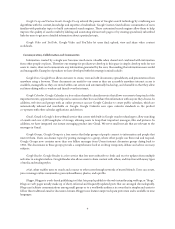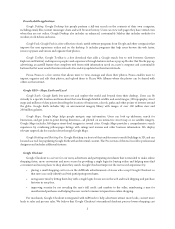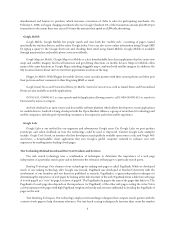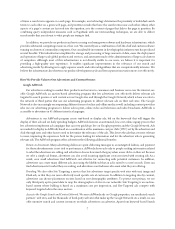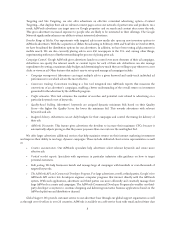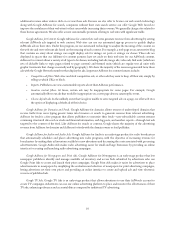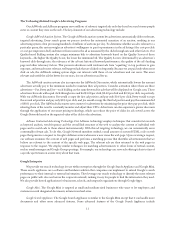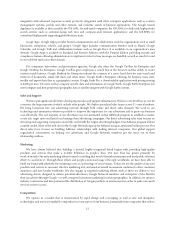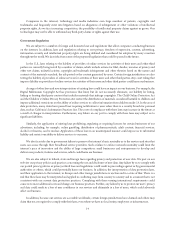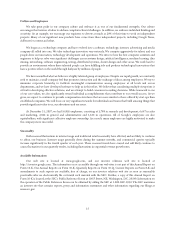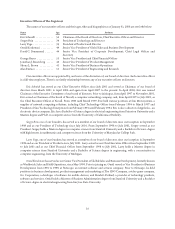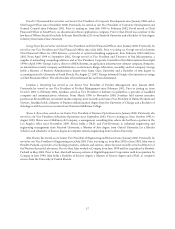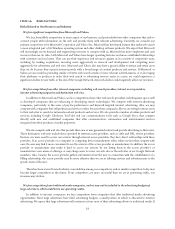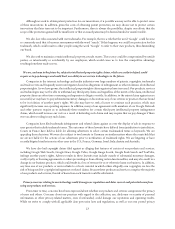Google 2007 Annual Report Download - page 28
Download and view the complete annual report
Please find page 28 of the 2007 Google annual report below. You can navigate through the pages in the report by either clicking on the pages listed below, or by using the keyword search tool below to find specific information within the annual report.Companies in the internet, technology and media industries own large numbers of patents, copyrights and
trademarks and frequently enter into litigation based on allegations of infringement or other violations of intellectual
property rights. As we face increasing competition, the possibility of intellectual property claims against us grows. Our
technologies may not be able to withstand any third-party claims or rights against their use.
Government Regulation
We are subject to a number of foreign and domestic laws and regulations that affect companies conducting business
on the internet. In addition, laws and regulations relating to user privacy, freedom of expression, content, advertising,
information security and intellectual property rights are being debated and considered for adoption by many countries
throughout the world. We face risks from some of the proposed legislation that could be passed in the future.
In the U.S., laws relating to the liability of providers of online services for activities of their users and other third
parties are currently being tested by a number of claims, which include actions for libel, slander, invasion of privacy and
other tort claims, unlawful activity, copyright and trademark infringement and other theories based on the nature and
content of the materials searched, the ads posted or the content generated by users. Certain foreign jurisdictions are also
testing the liability of providers of online services for activities of their users and other third parties. Any court ruling that
imposes liability on providers of online services for activities of their users and other third parties could harm our business.
A range of other laws and new interpretations of existing laws could have an impact on our business. For example, the
Digital Millennium Copyright Act has provisions that limit, but do not necessarily eliminate, our liability for listing,
linking or hosting third-party content that includes materials that infringe copyrights. The Child Online Protection Act
and the Children’s Online Privacy Protection Act restrict the distribution of materials considered harmful to children and
impose additional restrictions on the ability of online services to collect information from children under 13. In the area of
data protection, many states have passed laws requiring notification to users when there is a security breach for personal
data, such as California’s Information Practices Act. The costs of compliance with these laws may increase in the future as
a result of changes in interpretation. Furthermore, any failure on our part to comply with these laws may subject us to
significant liabilities.
Similarly, the application of existing laws prohibiting, regulating or requiring licenses for certain businesses of our
advertisers, including, for example, online gambling, distribution of pharmaceuticals, adult content, financial services,
alcohol or firearms, can be unclear. Application of these laws in an unanticipated manner could expose us to substantial
liability and restrict our ability to deliver services to our users.
We also face risks due to government failure to preserve the internet’s basic neutrality as to the services and sites that
users can access through their broadband service providers. Such a failure to enforce network neutrality could limit the
internet’s pace of innovation and the ability of large competitors, small businesses and entrepreneurs to develop and
deliver new products, features and services, which could harm our business.
We are also subject to federal, state and foreign laws regarding privacy and protection of user data. We post on our
web site our privacy policies and practices concerning the use and disclosure of user data. Any failure by us to comply with
our posted privacy policies or privacy-related laws and regulations could result in proceedings against us by governmental
authorities or others, which could potentially harm our business. In addition, the interpretation of data protection laws,
and their application to the internet, in Europe and other foreign jurisdictions is unclear and in a state of flux. There is a
risk that these laws may be interpreted and applied in conflicting ways from country to country and in a manner that is not
consistent with our current data protection practices. Complying with these varying international requirements could
cause us to incur additional costs and change our business practices. Further, any failure by us to protect our users’ privacy
and data could result in a loss of user confidence in our services and ultimately in a loss of users, which could adversely
affect our business.
In addition, because our services are accessible worldwide, certain foreign jurisdictions have claimed and others may
claim that we are required to comply with their laws, even where we have no local entity, employees or infrastructure.
14


